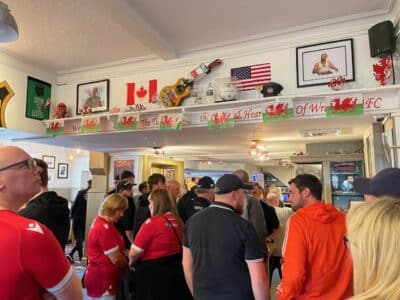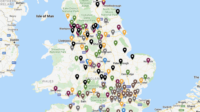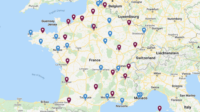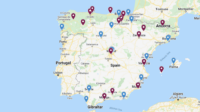Here is our map of English football clubs for the 2023-24 season. It includes the…
What “Welcome to Wrexham” Tells Us — Or Should, Anyway — About Football

Since I own a football-related company, and since I have been to more than 200 games all over the UK and Europe, many Americans have asked me what I think about the show “Welcome to Wrexham.” Or they have simply expressed their admiration for it, and the club. So I thought I would offer my thoughts on the matter.
Whether you’re a cynic, a dreamer, or just curious about the relationship between a town and its football club, “Welcome to Wrexham” is exactly what you think it is.
Is it a heart-warming underdog story? Absolutely. Well made? Definitely. Does it get right to the heart of what a football club means to a town? You bet. Does it show what it’s like to live and die with the results on the pitch? It does, in all the agony and ecstasy that entails. Is it a beautiful testament to why football is so much more than a game? No question.
Is it also a stark lesson on the state of the modern game? I’m afraid so. Is it an ego-trip, an exercise in brand-building, a narcissistic seizing of a precious community asset for a creative project and to show the world what great guys a couple of Hollywood stars are? I think so, yes.
You know what “Welcome to Wrexham” isn’t? You know what, with some reservations, Wrexham and Wrexham AFC are not? Unique.
Actually, the one thing that does make the show, if not the club, unique is also the thing that drives me the most crazy about it. But we’ll get into that. In fact, enough about Wrexham for right now.
Welcome to … Pretty Much Everywhere
Here’s the basic story: A former industrial town, filled with working-class people, falls on hard times because of forces well beyond its control. Unemployment is up, as is despair. Prosperity has seemingly come and gone, maybe for good. I call it the standard northern English town story.
But the one thing they have, that they have had for generations, is a football club to rally around. Sometimes that means pain, and sometimes glory, but it always means family and friends and community and a pint in the pub beforehand, and the people sat around you at the game, and the memories, good and bad. The time you went to Wembley. The time you beat a top-tier club in the Cup. The time you got relegated. The time some scumbag and/or incompetent owner almost drove the club out of business. The time the fans saved the club from oblivion – or didn’t. And all the countless moments you shared with everyone in town, moments that make up a life, that all took place down at the football ground.
That, I would like you to know, is the story of dozens upon dozens of places, all over the world – perhaps especially in England, Scotland and Wales, for I do believe the connection between the towns and cities in this part of the world and their local football clubs is something unique and special. Not better, not more impressive, not more pure, just … British. And the British map is dotted all over with towns that share Wrexham’s story. Glory, decline, and determination – but always football.
I know, because those stories have been told for generations. I also know because I have been there, and been to games, and sat in those grounds and done my best to talk, and listen, to the people there. Huddersfield. Barnsley. Stockport County. Hull. Grimsby. Luton. Rotherham. Barrow-in-Furness. Burton-on-Trent. Blackpool. Those names, and so many more, are an honor roll of hard work, dreaming, suffering, goals, promotions, relegations, songs and togetherness.
Little Screen, Big World
So sure, watch “Welcome to Wrexham.” And sure, dream of going there. But understand first of all that what you’re seeing has been edited for its emotional effect. It’s a production. Second, the Wrexham you see on that screen is already gone, to some extent because of all the people watching that show. To watch is to change, after all. That pub with a handful of locals in Season One? It gets a couple dozen tourists a day now.
Yes, the club is on the up, but even that is a sad statement of the modern game. You don’t truly advance in the current world of football because you’re clever, or because you outwork people, or catch a few breaks – although those things help. You advance, really advance and go up the ladder, because somebody rich from some other place buys your club and pumps money into it – for whatever reason they choose to do so. See everybody from Forest Green Rovers to Manchester City and, now, Newcastle. And in that sense, “Welcome to Wrexham” is, for me, tinged with sadness, because it is a pure statement of what the game has become.
I can only assume, having not been there, that the good people of Wrexham don’t care at all who bought their club, stabilized its finances, bought back the stadium, and started spending money left and right. Cameras, foreigners in the ground, owners who are rarely around – whatever. They want what everybody wants: their club to do well. And for that, you need money, usually from a foreign owner.
Just don’t forget that, other than the age of the club and their ground, the only thing special about Wrexham in this exact moment is that their rich owner arrived. That, and the TV show. And the only thing special about the show, the only thing that sets it apart from “Sunderland til I Die” and “Take Me Home Leeds United” and others, is that the owners put themselves in the middle of it. Sure, the frustrations of a football club owner are interesting to see, as is the byzantine world of football finances and British law. But – and to their credit, they’ve been very open about this – a simple fact should, I think, be kept in mind: They bought the club so they could make a show which is, in large part, about them buying the club. It’s an exercise in marketing, performance and brand-building – not the worst reason to buy a football club, for sure, and they seem to be doing a good job regardless. But it’s a show. They are actors.
Wrexham, Wrexham, Everywhere
My bottom line is this: The only reason 99% of the people now curious about Wrexham have even heard of it is that there’s a television program about it. And the role of media in setting the social agenda, like the role of money in football, I just find frustrating and depressing.
So, you watch the show and want to go to Wrexham? You want to meet those people, drink in that pub, see that ground? Excellent. I think you should. You’ll have a hell of a time getting a ticket, though, for the bandwagon is well and truly in town now. Even local, longtime fans are having a hard time getting in.
But here’s what you can also do, and what I would very strongly encourage you to do: Go to Chesterfield. Or Notts County. Or Port Vale. Or Portsmouth. Or Stockport County. Or Crewe Alexandra. Or Rochdale. Learn something about the club and the town, then walk into the pub, and say hello to someone. Then turn to the person next to you at the ground, tell them it’s your first time here, and see if they want to chat. If they don’t, leave them alone. But if they do, and they usually do, then please make the most of your time with that person, and that club, and that town, and don’t worry about what you see on television.
Let “Welcome to Wrexham” be a gateway, not a destination. What you’re looking for is not just there but in football grounds up and down the land, every Saturday afternoon.









Post Comments
This is such a candid, thoughtful, nuanced take–one faithful to the complex and varied elements of the show, the town, the team. I couldn’t quite articulate my reservations about the show… here they are. Will be visiting the region in August and am absolutely planning to visit grounds–mainly smaller ones!–that I have not been able to watch on TV in the states. I wish Wrexham fans well but am interested in a more authentic, genuine experience. And to the producers of the show–more game action, less Ryan & Ryan! Sheer torture at times.
Thanks, Dylan. I just watched an episode last night that was basically all about those two. Nothing can match the ego of a Hollywood star.